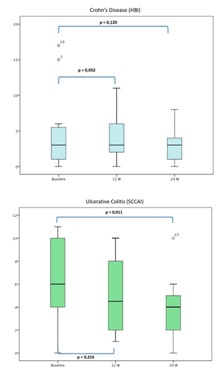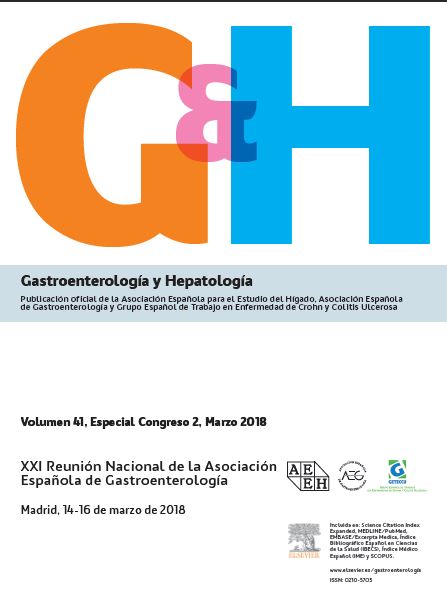P-54 - VEDOLIZUMAB DOSE ESCALATION AS A WAY OF RECAPTURING RESPONSE IN PATIENTS WITH INFLAMMATORY BOWEL DISEASE
1Guy's and St Thomas' NHS Foundation Trust, Department of Gastroenterology, London, United Kingdom. 2Hospital Universitario Ramón y Cajal, Gastroenterología y Hepatología, Madrid.
Introduction: Increasing vedolizumab (VDZ) dosing frequency with the purpose of recapturing response has been shown to be effective in the context of clinical trials but there is limited real-life data from clinical practice.
Methods: A retrospective cohort study was performed by reviewing prospectively recorded clinical data for all patients who received treatment with VDZ at a single centre between November 2014 and October 2017. Patients who had lost response and had been escalated to 6 or 4 weekly infusions were identified. Of the total 139 patients on VDZ, 36 (27%) had been escalated to Q4 (30) or Q6 (6), (72% male, median age 44, previous biologics exposure 81%, 49% concomitant IM). 18 patients had CD, 14 UC, and 4 IBD-U which were included in the UC group for the purpose of analysis. Duration of VDZ before and after dose escalation with a median of 7m. Currently 76% remain on VDZ after dose escalation. Clinical response was defined as HBI or SCCAI reduction > 3. Remission as HBI < 5 or SCCAI < 3. Paired HBI, SCCAI, CRP values at baseline, week 12 and 24 were compared using Wilcoxon signed-rank test.
Results: Patients with CD had a median HBI of 4 (range 0-27), 4 (0-29) and 3 (0-8), at baseline, 12, 24 w. In the UC group, the median SCCAI was 6 (range 0-11); 4.5 (1-11), and 4 (0-10). CRP at baseline was a median of 6 (1-23), 5 (1-46), and 2 (1-17). Statistically significant differences were noted in the UC group between SCCAI at baseline and after 24 weeks (p 0.01) and overall CRP at baseline and 24w (p 0.04). Of all patients with clinically active disease at baseline (n = 20), 5 achieved clinical response (25%) and 4 achieved clinical remission (20%).

Conclusions: In a real life setting, increasing dosing frequency in patients with loss of response to VDZ is effective in approximately half of patients and should be considered as an intervention in patients with secondary loss of response.








